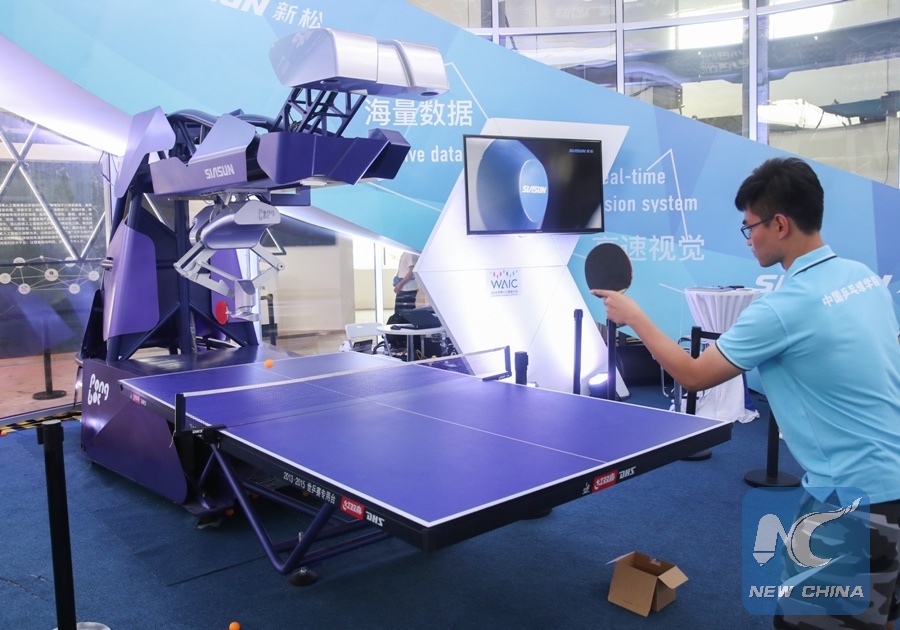
File Photo: A staff member plays table tennis with a robot during the World Artificial Intelligence Conference (WAIC) 2018 in Shanghai, east China, Sept. 17, 2018. (Xinhua/Ding Ting)
SAN FRANCISCO, Oct. 2 (Xinhua) -- China is poised to win a long-term race against the United States in high-tech development opportunities as the world's most populous country is investing more in science and education than the United States, a Silicon Valley senior executive said Tuesday.
"The U.S. educational system ranked 30th in math, 23rd in science and 17th in reading in the world, but China is the first in all the three. With no changes to this situation, it can hardly convince me that the U.S. will win the long-term battle to dominate high tech," said Casey Roche, a 40-year veteran in the field of Silicon Valley startups, in response to a comment on China and the United States by a famous artificial intelligence (AI) expert in the high-tech community at a recent innovation forum in northern California.
Addressing the 2018 Silicon Valley Innovation and Entrepreneurship Forum (SVIEF 2018) that ended Sunday in the heart of the South Bay Area, Kai-Fu Lee, CEO of Sinovation Ventures and former head of Google China, said in a keynote speech that it does not matter whether China is leading the United States or vice versa because of their strikingly different ways of development.
The U.S. growth is driven by research and a vision that encourages brilliance in ideas, while China is application- and results-driven, leading to a resilient Chinese model of entrepreneurship, Lee told a large congregation at the SVIEF 2018 annual conference designed to showcase and encourage the creativity of young entrepreneurs.
This year's SVIEF focused on blockchain and AI technology that appealed to both senior corporate executives and startup engineers who held high hopes for the next generation of innovation slated to shape the future.
"The U.S. is way ahead in research and has been at the center of every technological revolution in the past 30 years. Chinese entrepreneurs can find inspiration and learn from it," Lee said.
Regarding the United States as a teacher at the early stages of development, China managed to develop a completely different and exciting way of building impregnable businesses, said the president of Sinovation Ventures.
In the last 10 years, China has seen a huge increase in capital investment from "smart venture capital (VC)" that helps smart entrepreneurs build products and companies, Lee said.
Due to the combined success of the two, China has seen a growth of "150 million to about 800 million users -- by far the largest user base in the world," which has in effect created "a system that parallels Silicon Valley," Lee said.
Looking forward, China will take advantage of its business model to build AI technology and applications, he said, adding that China will probably be ahead in four or five years in the implementation of AI technology, while the United States will continue to lead research for the next 10 or 15 years. However, their competition is not a zero sum game as there are two different systems that contribute to the overall global technological success, Lee said.
As to the groundbreaking blockchain technology that would ultimately lead to mass decentralization across industries, Professor Shoucheng Zhang of Stanford University expounded on the cyclical nature of centralization and decentralization.
The key element of blockchain that would ultimately contribute to decentralization is represented by its consensus-reaching mechanism, Zhang said.
With blockchain's "proof of work" algorithm, data is efficiently gathered and fed to AI, he said, noting that blockchain technology can be applied to healthcare, education, voting, finance, commerce, and even energy management.
SVIEF 2018 is the largest cross-border high-tech forum held in the Bay Area, which touched upon thought-provoking topics ranging from AI, blockchain, autonomous driving and new media to education.

